Ethiopia's ‘false banana’ could solve climate change induced food shortages
 A fruit often referred to as the “false banana”, found in Africa, has the potential to solve food shortages that could be induced by climate change and drought, said a new study.
A fruit often referred to as the “false banana”, found in Africa, has the potential to solve food shortages that could be induced by climate change and drought, said a new study.
The ‘wondercrop’ called “enset” is available in certain parts of Ethiopia. Unlike bananas, its flesh cannot be consumed. Rather, its roots and stems can be fermented to make porridge and bread.
Except the seeds, the rest of the edible parts of the plant can be boiled like potatoes.
Aficionados of the Ethiopian delicacy tend to ferment the plant for several years to improve flavour to use it for a wide variety of foods.
The crop is said to have been first domesticated about 10,000 years ago.
Its fibrous material can even be used to make clothes, said the research published in Environmental Research Letters.
New research shows this plant is also able to withstand a wide range of conditions, which makes it an ideal crop to be farmed in large swathes of Africa, reports The Telegraph.
“This is a crop that can play a really important role in addressing food security and sustainable development,” Dr Wendawek Abebe, of Hawassa University in Ethiopia, told BBC.
The plant is known as a “monocarpic herb”, which is closely related to the banana and provides a source of starch to more than 20 million people in Ethiopia, the second most populous nation in Africa.
“It’s got some really unusual traits that make it absolutely unique as a crop,” said Dr James Borrell, study co-author from the Royal Botanic Gardens, Kew.
Its deep roots and high water retention make it relatively drought resistant, and the parts of the plant harvested (stems and roots) are more resistant to bad weather than flowering crops.
“You plant it at any time, you harvest it at any time and it’s perennial. That’s why they call it the tree against hunger,” Borrell added.
You can return to the main Market News page, or press the Back button on your browser.

